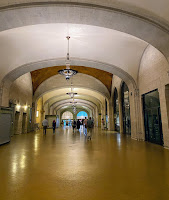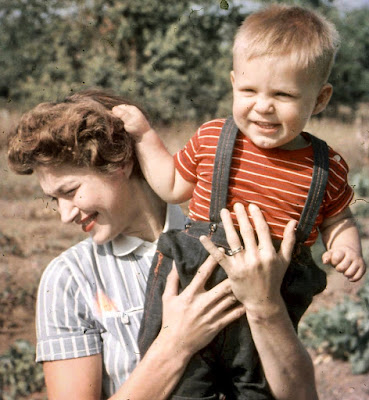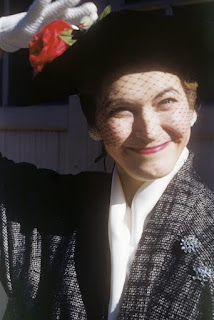“More people with white privilege are learning about racial dynamics and social justice terminologies than ever before. They are awakening to the fact that their white privilege has protected them… This work is not about those white people ‘out there.’ It is about you. Just you.”
— Layla Saad, “Me and White Supremacy” (2020)
By Bob Varettoni
It was the morning after Kim Kardashian wore Marilyn Monroe’s dress to the $35,000-a-ticket Met Gala, and Robert Anderson thought nothing in the world made sense anymore.
He didn’t belong anywhere. Even here, sitting in a car behind the same couple he shared an inbound commute with for many years.
The car was about to round the corner of the Lincoln Tunnel helix, promising a view of the New York City skyline.
The driver and his wife were Robert’s neighbors in a wealthy suburb of New Jersey. They owned a small business at the South Street Seaport and after driving through the tunnel, they’d drop Robert off in Midtown, blocks from his office, before continuing south.
This long-standing arrangement was about to end. His neighbors had informed him of their retirement plans the day after Russia invaded the Ukraine. The commute had grown longer each day, with roads filled with nastier drivers the longer the pandemic endured. His neighbors had grown tired.
In the dawn gloom, with the car at a standstill in rush-hour traffic, Mrs. Neighbor applied makeup by the light of the mirror on the lowered passenger-side visor. She was prattling about what she had gleaned from media coverage of the Met Gala.
As usual, Robert sat behind her husband. This gave Robert the best view of the skyline as it flickered between the moving traffic in the adjacent bus lane.
The mirror’s faint light and the dirty rear window allowed Robert to catch a reflection of his face superimposed over the skyline across the Hudson River. It was as if he were a subliminal message in an advertisement.
Robert was staring blankly at a kinescope version of New York. The city stared blankly in return. It seemed to Robert that everyone his own age, everyone he had relied on and who had supported him, was giving up.
“I don’t even belong
here,” he thought again. The car completed its sweeping turn toward the E-ZPass toll and slowly edged its way into the tunnel.
“Hell, with tiles,” Robert said, once they were under the river. His neighbors didn’t hear since they weren’t paying attention to him.
---------
Outside the tunnel, the car made better progress along West 40th Street.
Robert reflected on newly familiar sights. The city was barely recognizable from the one he had fallen in love with during his first rides to work three decades ago.
On Eighth Avenue, they passed the new sleek, silver version of the Gray Lady headquarters. Then, passing Seventh Avenue and into the Garment District, a familiar sight: the giant Needle Threading a Button statute on the corner of “Fashion Avenue” and 39th. Installed in the 1970s, it would soon be refurbished, Robert had read.
Approaching Broadway, they passed a narrow pedestrian plaza named after Golda Meir, the former prime minister of Israel. It was filled with 14 oversized thin-bodied sculptures, in a diversity of colors, with oversized hands. They reminded Robert of aliens from the science fiction stories he read as a boy. They seemed to be waving hello.
A block further, the car approached the southwest edge of Bryant Park, a corner named after the inventor Nikola Tesla. Out of habit, Robert shifted sides in the back seat, positioning himself for an easy escape before his neighbor turned right to head south on Fifth Avenue.
Robert had an ulterior motive in sliding closer to a view of the sidewalk. Some part of him anticipated the temporary backup in traffic in the middle of the long block between Sixth and Fifth. Here, outside the former American Radiator Building, Robert tried to catch a glimpse of the receptionist in the grand lobby with 30-foot ceilings.
This woman had red hair, in curls, and she often wore floral-print dresses. Her desk faced West 40th Street. It was as if she were on display through the large ground-floor windows.
Once, long ago, she had seen Robert in the car watching her. She winged her elbows, shielding her eyes with her hands to cut down the glare and get a better view. Then she smiled at him in return.
Today, this lobby is a shell of its former self. Gutted and plain. In 2022, it is an uninspired annex to a Gothic Art deco black-bricked skyscraper that had inspired a Georgia O’Keeffe painting in 1927. If Robert had looked up at the setback terraces above the lobby’s base, he would have still seen gold-accented allegorical sculptures of matter transforming into energy.
Instead, Robert looked where he used to see the red-haired receptionist. Both she and her ornate surroundings were long gone. In fact, he could barely see through the large front windows, now plastered with signs identifying the site as a community college.
“What community?” Robert wondered, this time in a whisper.
Hoping for an angel, he found only a ghost.
Then Robert was in motion again, riding past a row of blue rental bikes bearing logos of a bank, until his car pulled over on the corner of Fifth Avenue. He slipped out the back seat, outside the former Knox Hat Building (a quaint Beaux arts structure now subsumed by the headquarters of another bank) and wished his neighbors well.
“
Happy birthday, Mister President,” sang Mrs. Neighbor.
“Thank you!” he replied, surprised and touched that someone had remembered.
---------
Robert began the familiar 10-minute, half-mile trek to his soulless office, dubbed Commerce Place, at Lexington Avenue between 43rd and 44th streets.
Walking north on Fifth Avenue, he passed the marble lions of Patience and Fortitude guarding the front entrance of the main branch of the New York Public Library. The street sign called it John Bigelow Plaza, after the historian who had edited the complete works of Benjamin Franklin.
At the start of the pandemic, the library decorated the lions with oversized hospital masks. But, these days, masks were optional, and Robert noticed that most on the already-crowded sidewalk, including the statues, were maskless.
Most everyone was also younger than him too. They walked while staring at phones or talking to others through wireless earbuds. Or, like Robert, sometimes talking to themselves.
One hurrying white man, who reminded Robert of himself when he was younger, tried to walk right through him from behind, as if
Robert were a ghost.
Minutes later, minutes older, he was standing in the shadow of One Vanderbilt, a massive skyscraper that had opened during the pandemic. Robert had been one of the first to tour its observation deck. Its ground floor was home to yet another bank, and its lobby featured three untitled statues of what again reminded him of aliens from space. These elongated, silver-bodied sculptures were armless, not as welcoming as those in Golda Meir Square.
Opposite that was Robert’s favorite building in New York: Grand Central Terminal.
He neared its southwest corner entrance on 42nd Street under the watchful eye of the gold-leaf Vanderbilt Eagle, a 3,000-pound iron statue perched on the viaduct that circles the terminal. A marker outside the entrance explains it is one of 12 such eagles that formerly graced the roof of the original Grand Central Station in 1898.
“F*ck America! God bless my dick!”
This startled Robert. He hadn’t noticed the wild-eyed man wearing sandals and a dirty red t-shirt.
The man was approaching passersby in front of the entrance. Most simply averted their eyes and kept walking. He flailed his arms and shouted again.
“F*ck America! God bless my dick!”
The man defiantly shook his dreadlocks and stood right in front of Robert, almost touching him.
“F*ck America! God bless my dick!” the man shouted, louder and with more urgency.
“Jesus!” Robert exclaimed, then hurried past, hands covering his face, since the raving stranger was unmasked.
Robert escaped into the terminal and joined a crowd walking down a long brick-tiled ramp. This led first past a wide marble-arched entrance to the dining concourse, and then to a similar entrance to a grander place: Grand Central’s main concourse.
The sight of it brought to mind his 7th birthday and his first visit to Yankee Stadium. His dad had elaborately tipped a cigar-chewing fat man in a ticket booth on 161st Street in exchange for field-level seats. Emerging through an archway in the concession area, holding his dad’s hand, Robert’s first view of the impossibly green, expansive baseball field gave him goosebumps. How could something be real and, at the same time, bigger than life?
Grand Central’s concourse evoked the same feeling, and Robert took in the moment.
Before him, in the great hall, he saw a flock of commuters dressed in various disguises. Some could barely hide their claws and teeth amid the anarchy of the poor and the homeless. Masked, elderly wanderers looked lost and walked tentatively, heads down, like geese on thin ice. Itinerant travelers wore distracted faces.
Robert looked to his right, toward a corner ticket booth like the distant one at Yankee Stadium. Brass bars separated buyer from seller, and it advertised “Official Grand Central Terminal Guided Tours.” These had ceased when the pandemic started, and perhaps would never resume.
Enshrined in front of the ticket window, a man slumped upon a cart full of his possessions. Robert recognized him, a familiar beggar. His forehead rested squarely on the marble countertop, and he was fast asleep. With nowhere else to rest unobtrusively at this hour, this was his temporary home.
Instinctively, Robert averted his gaze.
The West Balcony to his left, he had read, was a replica of the Grand Staircase at the Paris Opera House. Robert had never been to Paris, but years ago, in a moment of romance on this balcony, he had kissed another red-haired woman who still haunted his dreams. On the vaulted ceiling above them, dimly lit motionless stars with images of the zodiac outlined in faint gold paint had conveniently suspended time.
The concourse ceiling was an odd, self-contained universe. Its mural jumbled east and west, so the constellations were in reverse of their proper order. When Robert had visited the observation deck at One Vanderbilt next door, he looked down on this very spot to imagine the heavens from God's point of view.
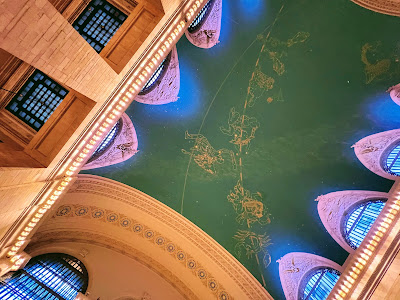
This morning, Robert began his diagonal walk across the concourse, from beneath a double-reverse image of Orion toward the immortal winged horse Pegasus. Along the way, he passed the four-sided opal-faced brass clock above Grand Central’s circular information booth. He skirted the East Balcony, which was now a retail showroom filled with upscale electronics manufactured by suppliers who violated Chinese labor laws.
A line had formed at the foot of this stairway, with people waiting for the store to open. Robert observed three tourists from the Far East and a man in a weathered VFW baseball cap. The veteran wore shorts, displaying a prosthetic leg, and he nursed coffee from an Anthora — a blue, white and gold Greek-themed paper cup that read “We are happy to serve you.”
Last in line was the man Robert perceived as the younger version of himself, the one who had nearly knocked him over in front of Patience on Fifth Avenue. The man was engrossed in his cell phone, watching a news video of Marilyn’s ghost, dyed blonde, posing on a red carpet.
---------
Robert Anderson’s birthday journey was near its end.
He entered another marble-vaulted hallway that would lead to an exit, with his office across the street on Lexington Avenue. This Graybar Passage derived its name from Elisha Gray and Enos Barton, founders of the electric company that had originally leased the adjoining Art deco building.
He slowed his steps. The acoustics here made it an attractive venue for street musicians. This morning it echoed with the words of a young woman.
She was sitting on the marble floor, her back against the wall, next to upscale bodega signs for coffee and cold beer. She had surrounded herself with plastic tote bags filled with books.
Despite wearing a short black skirt, the woman splayed her legs, with the toes of her white sneakers pointed toward the ceiling. Her black tights were embossed with white skeleton bones, corresponding to the legs of her hidden flesh. Her lips were vibrant red.
She was reading aloud from one of her books: “More people with white privilege are learning about racial dynamics and social justice terminologies…”
She looked up as Robert approached. Their eyes met. He kept walking, and she kept reading. After a few indecipherable words, she increased her volume and Robert heard, “This work is not about those white people
out there.” One pause. “It is about
you.” Another pause. “Just you.”
Robert did a double take. He glanced back to see the young woman, head down, her face buried close to the open pages of her book. She seemed oblivious to her surroundings, and they seemed somehow to be alone. He stood dumbly for a second beside a storefront window advertising the next generation of wireless service, then headed again for the exit.
A heartbeat later, he was bumped from behind.
Robert felt something warm against the back of his neck. He let out an inarticulate cry. He thought he was being mugged and flinched to withstand another attack.
When none occurred, he reached behind him in the mugger’s direction, but grabbed only air. He turned to see a pair of skeleton legs retreating toward the main concourse. The woman’s hurried footfalls made no sound, and she was reaching behind her head to gather her ponytail, which had come half undone.
Frantically, Robert fingered his neck and felt a sticky substance.
He looked down at his hands and saw proof of life and evidence of where he belonged.
When he examined the red on his fingertips, he found lipstick where he had expected to find blood.
# # #

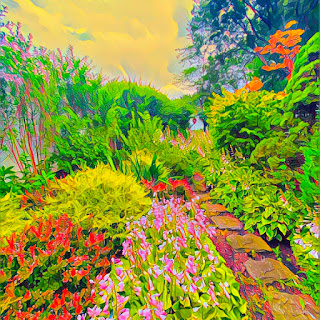
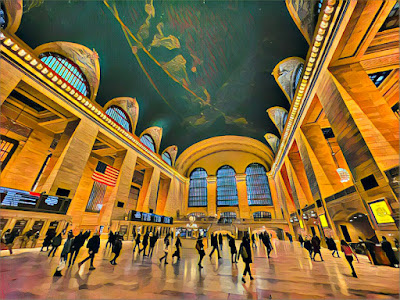
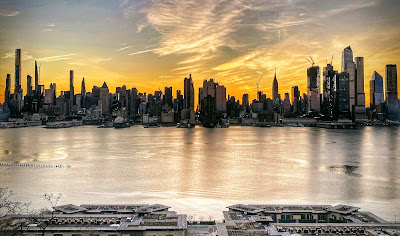


.jpg)


